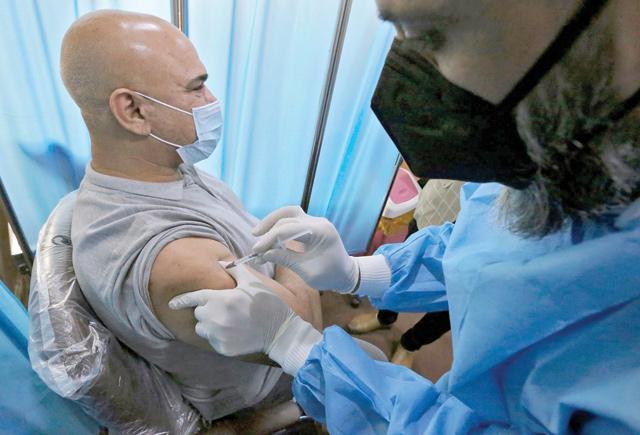- International News
- Web-2021-03-03 | 05:07 pm

BAGHDAD — Iraq began coronavirus vaccinations on Tuesday, inoculating medical staff hours after a military plane brought in 50,000 Sinopharm jabs donated by China.
The campaign was launched as Iraq battles a second wave of COVID-19 infections, with more than 4,600 new cases a day, and ahead of a three-day visit by Pope Francis from Friday.
"The vaccines arrived overnight and we immediately distributed them to health centres and began the vaccinations," Health Minister Hassan Al Tamimi told AFP on site at Baghdad's Medical City hospital compound.
"We will be carrying out more vaccinations tomorrow in the provinces and remote areas."
Aside from health workers, security forces and the elderly will be first to receive the free-of-charge vaccine, his ministry said on a citizens’ registration platform which, however, was not functional on Tuesday.
The public health infrastructure in Iraq, a country of 40 million, has been severely worn down by decades of war, under-investment and corruption.
The health ministry has said it agreed with the Chinese ambassador in Baghdad to purchase another two million Sinopharm doses, but provided no details on the cost or the timing.
Iraqi authorities said in January they had approved three vaccines for use, but there have been repeated delays and contradictory statements from health authorities.
The health ministry said Tuesday it was expecting to receive a total of 16 million jabs through the global Covax scheme, through which wealthy nations are meant to allocate vaccines for poorer countries.
That figure appeared to be based on Covax’s pledge that, subject to funding, it could help poorer countries vaccinate 20 per cent of their populations — or eight million people in Iraq.
The health ministry has also said it would receive three million AstraZeneca jabs, but the World Health Organisation has only approved the distribution of two million of those doses to Iraq through Covax.
The ministry also says it has secured funding from the World Bank for 1.5 million jabs from Pfizer/BioNTech, but the deal requires a parliamentary vote which has yet to be held.
Sinopharm affiliate the Wuhan Institute of Biological Products says its vaccine has an efficacy rate of 72.51 per cent, behind rival jabs by Pfizer/BioNTech and Moderna, which have 95 per cent and 94.5 per cent rates respectively.
Secret vaccinations
The Iraqi government has faced growing criticism over its handling of the second wave of the pandemic.
Tuesday saw one of the highest daily numbers recorded in recent months, with more than 4,600 new infections after they had dropped to around 700 a day late last year.
Deaths reached 30 on Tuesday after they had fallen to single digits in December.
To slow the spread, Iraq has imposed overnight curfews on weekdays and full lockdowns on Fridays, Saturdays and Sundays, and made mask-wearing obligatory in public.
But little commitment has been shown by either the public or the security forces deployed to enforce the measures.
Iraqis are also broadly wary about vaccinations, according to a World Bank survey of nearly 10,000 people last month.
It found that "hesitancy prevails” with only 39 per cent of respondents saying they would take a vaccine, a figure that rose to 42 per cent among health workers.
The biggest concerns among the sceptics were fears of alleged associated health risks or low trust in Iraq’s health sector.
Some Iraqi officials have, however, already been vaccinated.
Two current and one former Iraqi official told AFP in January they had received doses of "the Chinese vaccine”.
They said 1,000 vaccine doses had been gifted to a senior Iraqi politician through contacts in China and had been distributed to top politicians and government officials.













